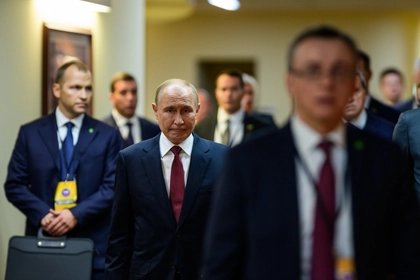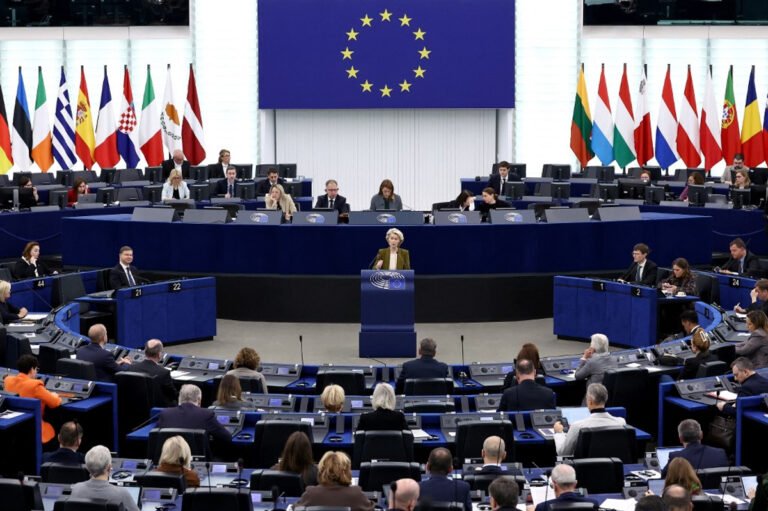European Union countries are urgently developing a contingency “plan B” to prevent Ukraine from running out of money early next year, as disagreements persist over whether to use Russia’s frozen state assets to finance Kyiv’s war effort.
With peace talks intensifying and Ukraine facing a mounting fiscal crisis, EU officials are now considering a short-term “bridging loan” financed through EU borrowing if a long-debated reparations loan backed by Russian reserves cannot be approved in time, Politico reported on Wednesday.
JOIN US ON TELEGRAM
Follow our coverage of the war on the @Kyivpost_official.
At a summit last month, EU leaders sought to agree on a proposal to use Moscow’s immobilized reserves for a €140 billion ($162 billion) reparations loan for Ukraine, but the plan encountered strong resistance from Belgian Prime Minister Bart De Wever, whose country holds the frozen assets.
“If we don’t move, others will move before us,” one EU official, speaking on condition of anonymity, told Politico, highlighting growing pressure for swift action.
Bridging loan gains momentum
Policy officials and diplomats in Brussels are increasingly focusing on a temporary financing mechanism to keep Ukraine solvent in the first months of 2026 if the reparations loan cannot be finalized before the EU summit scheduled for Dec. 18.
According to four officials cited by Politico, the proposed bridging loan would be funded through EU borrowing and serve as an interim measure while negotiations continue on a long-term solution using Russian assets.

Other Topics of Interest
Former US Officials Demand ‘Hard Belly’ from West to Counter Putin in Ukraine
Veteran US diplomats and a NATO general warn accelerated Trump peace push will fail unless Moscow is shown firm resolve.
Two diplomats said Ukraine could later be required to repay the bridging funds once longer-term financing is in place, while another option under discussion would combine the reparations loan with joint EU borrowing.
European Commission President Ursula von der Leyen indicated that a draft legal text on the reparations loan would soon be presented, telling lawmakers in Strasbourg: “The next step is now that the Commission is ready to present a legal text,” though she did not specify a timeline.
She later added: “I cannot see any scenario in which the European taxpayers alone will pay the bill.”
Political obstacles and legal concerns
Despite intensified discussions between Belgium and the European Commission, De Wever has continued to express reservations rooted in legal risks and the prospect of Russian countermeasures if the frozen funds are used.
Meanwhile, several EU member states – including France, Germany, the Netherlands, Lithuania and Luxembourg – have pressed the Commission to accelerate proposals aimed at securing Ukraine’s financing, officials briefed on the discussions said.
EU Economy Commissioner Valdis Dombrovskis warned earlier this month that delays would worsen the situation, noting: “The longer we now run delays, the more challenging it will become.”
The creation of a bridging loan through joint EU borrowing would require unanimous approval from all 27 member states, with Hungary seen as a potential obstacle due to its longstanding opposition to new funding measures for Ukraine.
Funding linked to peace negotiations
European officials said renewed diplomatic momentum driven by US President Donald Trump’s push for a peace deal has added urgency to the financial debate, as evolving drafts of a peace framework reportedly include references to using the frozen Russian assets to support Ukraine’s reconstruction.
EU diplomats reacted negatively to proposals in an earlier US draft suggesting Washington might profit from the use of the assets, and are now seeking assurances that European leaders will retain final authority over their deployment, as well as over the timing of sanctions relief and Ukraine’s prospective EU membership path.
French President Emmanuel Macron said this week that EU allies would finalize a solution “in the coming days” that would “secure funding” and “give visibility to Ukraine.”
Despite the discussions around alternative models, EU officials stressed privately that the reparations loan remains the preferred long-term solution.
“We really do not see any other possible option than the reparations loan,” one diplomat said, adding that any alternative must not delay progress as financial pressure on Kyiv continues to mount.

